HLSC111 Case Study: Motivating Patients for Health Behavior Change
VerifiedAdded on 2022/11/01
|9
|2342
|446
Case Study
AI Summary
This case study focuses on a 58-year-old overweight patient, Harry, admitted for hip replacement surgery, who needs to lose weight to improve his health and post-operative care. The assignment explores how a nurse can use motivational interviewing and the Transtheoretical Model of Change (TTM) to encourage Harry to modify his health behaviors. It examines the six stages of the TTM, including precontemplation, contemplation, preparation, action, maintenance, and termination, and how motivational interviewing techniques can be applied at each stage. The analysis highlights the importance of establishing a therapeutic relationship, setting short-term and long-term goals, and providing continuous support to help Harry move from the contemplation stage to the maintenance stage. The study emphasizes the role of nurses in guiding patients toward healthier lifestyles, addressing the challenges of obesity, and preventing associated health complications. The assignment references relevant literature to support the application of these strategies in a clinical setting.
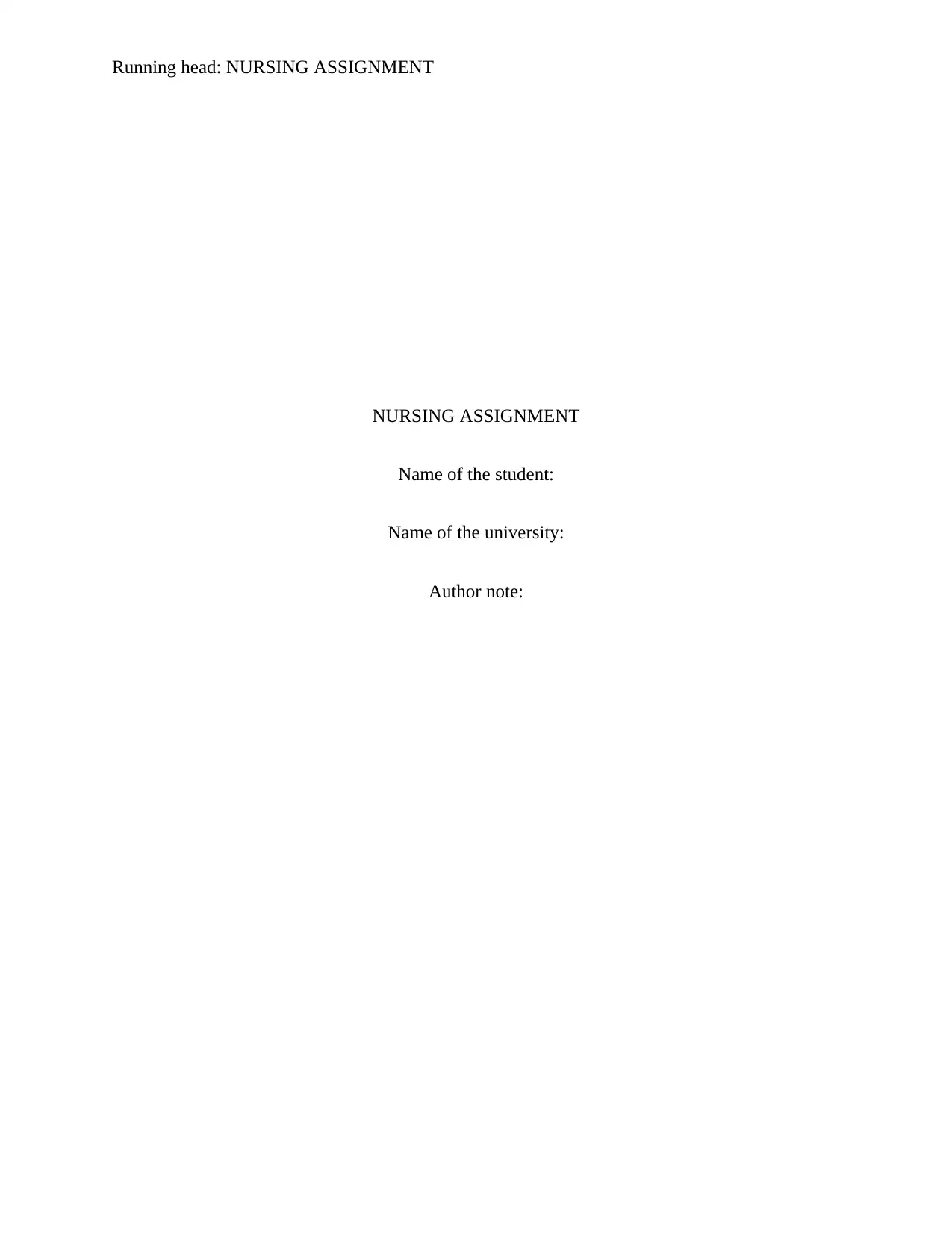
Running head: NURSING ASSIGNMENT
NURSING ASSIGNMENT
Name of the student:
Name of the university:
Author note:
NURSING ASSIGNMENT
Name of the student:
Name of the university:
Author note:
Paraphrase This Document
Need a fresh take? Get an instant paraphrase of this document with our AI Paraphraser
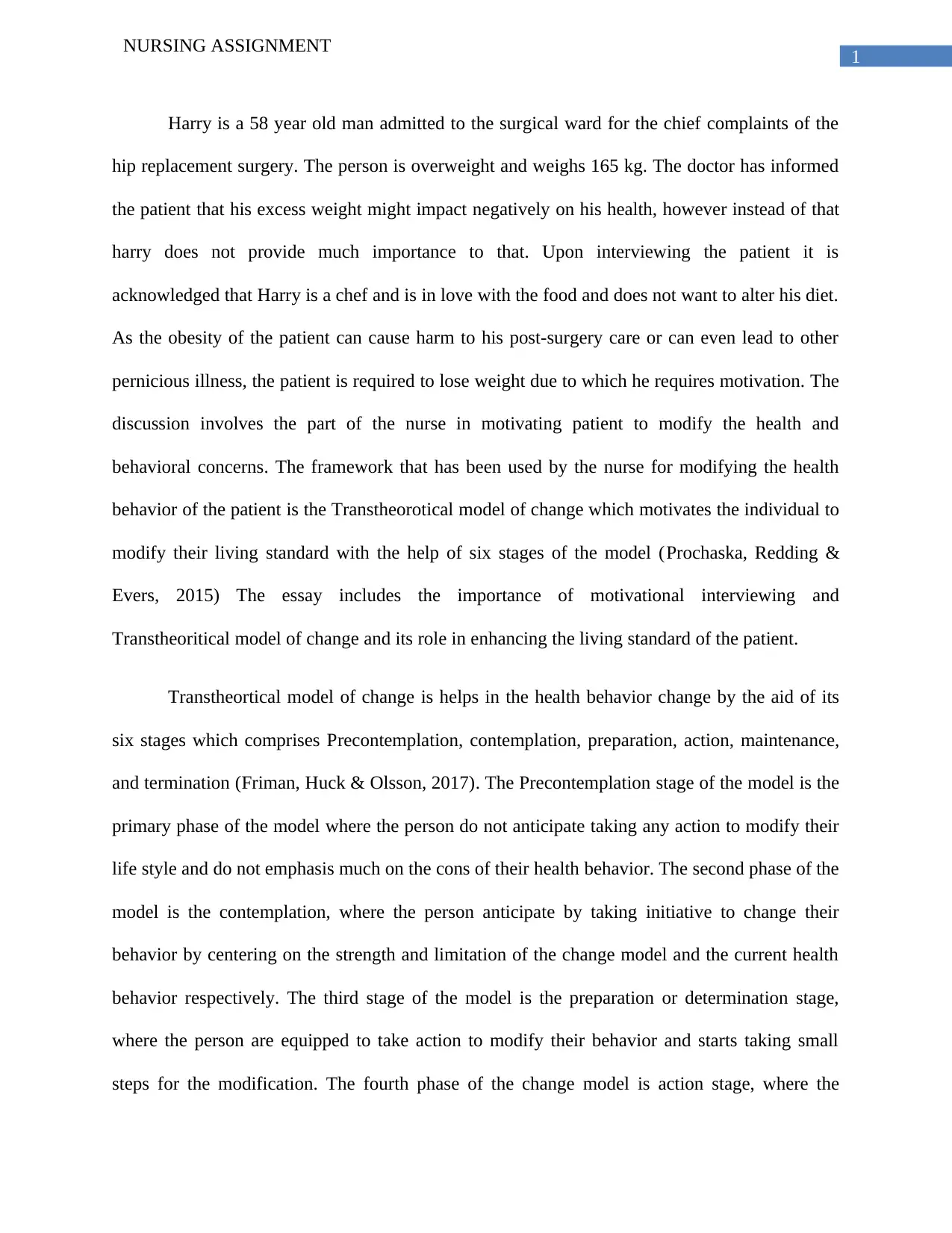
1
NURSING ASSIGNMENT
Harry is a 58 year old man admitted to the surgical ward for the chief complaints of the
hip replacement surgery. The person is overweight and weighs 165 kg. The doctor has informed
the patient that his excess weight might impact negatively on his health, however instead of that
harry does not provide much importance to that. Upon interviewing the patient it is
acknowledged that Harry is a chef and is in love with the food and does not want to alter his diet.
As the obesity of the patient can cause harm to his post-surgery care or can even lead to other
pernicious illness, the patient is required to lose weight due to which he requires motivation. The
discussion involves the part of the nurse in motivating patient to modify the health and
behavioral concerns. The framework that has been used by the nurse for modifying the health
behavior of the patient is the Transtheorotical model of change which motivates the individual to
modify their living standard with the help of six stages of the model (Prochaska, Redding &
Evers, 2015) The essay includes the importance of motivational interviewing and
Transtheoritical model of change and its role in enhancing the living standard of the patient.
Transtheortical model of change is helps in the health behavior change by the aid of its
six stages which comprises Precontemplation, contemplation, preparation, action, maintenance,
and termination (Friman, Huck & Olsson, 2017). The Precontemplation stage of the model is the
primary phase of the model where the person do not anticipate taking any action to modify their
life style and do not emphasis much on the cons of their health behavior. The second phase of the
model is the contemplation, where the person anticipate by taking initiative to change their
behavior by centering on the strength and limitation of the change model and the current health
behavior respectively. The third stage of the model is the preparation or determination stage,
where the person are equipped to take action to modify their behavior and starts taking small
steps for the modification. The fourth phase of the change model is action stage, where the
NURSING ASSIGNMENT
Harry is a 58 year old man admitted to the surgical ward for the chief complaints of the
hip replacement surgery. The person is overweight and weighs 165 kg. The doctor has informed
the patient that his excess weight might impact negatively on his health, however instead of that
harry does not provide much importance to that. Upon interviewing the patient it is
acknowledged that Harry is a chef and is in love with the food and does not want to alter his diet.
As the obesity of the patient can cause harm to his post-surgery care or can even lead to other
pernicious illness, the patient is required to lose weight due to which he requires motivation. The
discussion involves the part of the nurse in motivating patient to modify the health and
behavioral concerns. The framework that has been used by the nurse for modifying the health
behavior of the patient is the Transtheorotical model of change which motivates the individual to
modify their living standard with the help of six stages of the model (Prochaska, Redding &
Evers, 2015) The essay includes the importance of motivational interviewing and
Transtheoritical model of change and its role in enhancing the living standard of the patient.
Transtheortical model of change is helps in the health behavior change by the aid of its
six stages which comprises Precontemplation, contemplation, preparation, action, maintenance,
and termination (Friman, Huck & Olsson, 2017). The Precontemplation stage of the model is the
primary phase of the model where the person do not anticipate taking any action to modify their
life style and do not emphasis much on the cons of their health behavior. The second phase of the
model is the contemplation, where the person anticipate by taking initiative to change their
behavior by centering on the strength and limitation of the change model and the current health
behavior respectively. The third stage of the model is the preparation or determination stage,
where the person are equipped to take action to modify their behavior and starts taking small
steps for the modification. The fourth phase of the change model is action stage, where the
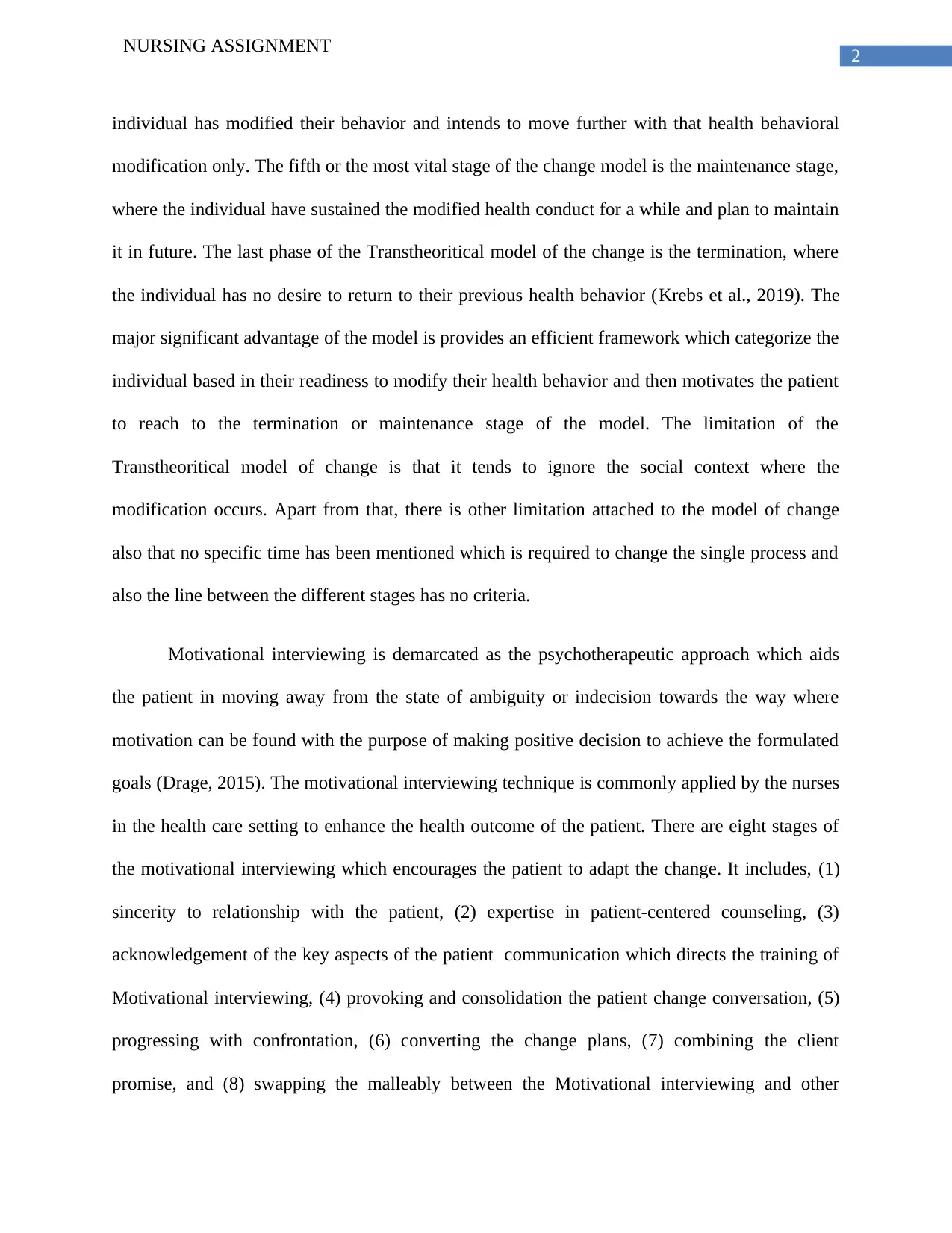
2
NURSING ASSIGNMENT
individual has modified their behavior and intends to move further with that health behavioral
modification only. The fifth or the most vital stage of the change model is the maintenance stage,
where the individual have sustained the modified health conduct for a while and plan to maintain
it in future. The last phase of the Transtheoritical model of the change is the termination, where
the individual has no desire to return to their previous health behavior (Krebs et al., 2019). The
major significant advantage of the model is provides an efficient framework which categorize the
individual based in their readiness to modify their health behavior and then motivates the patient
to reach to the termination or maintenance stage of the model. The limitation of the
Transtheoritical model of change is that it tends to ignore the social context where the
modification occurs. Apart from that, there is other limitation attached to the model of change
also that no specific time has been mentioned which is required to change the single process and
also the line between the different stages has no criteria.
Motivational interviewing is demarcated as the psychotherapeutic approach which aids
the patient in moving away from the state of ambiguity or indecision towards the way where
motivation can be found with the purpose of making positive decision to achieve the formulated
goals (Drage, 2015). The motivational interviewing technique is commonly applied by the nurses
in the health care setting to enhance the health outcome of the patient. There are eight stages of
the motivational interviewing which encourages the patient to adapt the change. It includes, (1)
sincerity to relationship with the patient, (2) expertise in patient-centered counseling, (3)
acknowledgement of the key aspects of the patient communication which directs the training of
Motivational interviewing, (4) provoking and consolidation the patient change conversation, (5)
progressing with confrontation, (6) converting the change plans, (7) combining the client
promise, and (8) swapping the malleably between the Motivational interviewing and other
NURSING ASSIGNMENT
individual has modified their behavior and intends to move further with that health behavioral
modification only. The fifth or the most vital stage of the change model is the maintenance stage,
where the individual have sustained the modified health conduct for a while and plan to maintain
it in future. The last phase of the Transtheoritical model of the change is the termination, where
the individual has no desire to return to their previous health behavior (Krebs et al., 2019). The
major significant advantage of the model is provides an efficient framework which categorize the
individual based in their readiness to modify their health behavior and then motivates the patient
to reach to the termination or maintenance stage of the model. The limitation of the
Transtheoritical model of change is that it tends to ignore the social context where the
modification occurs. Apart from that, there is other limitation attached to the model of change
also that no specific time has been mentioned which is required to change the single process and
also the line between the different stages has no criteria.
Motivational interviewing is demarcated as the psychotherapeutic approach which aids
the patient in moving away from the state of ambiguity or indecision towards the way where
motivation can be found with the purpose of making positive decision to achieve the formulated
goals (Drage, 2015). The motivational interviewing technique is commonly applied by the nurses
in the health care setting to enhance the health outcome of the patient. There are eight stages of
the motivational interviewing which encourages the patient to adapt the change. It includes, (1)
sincerity to relationship with the patient, (2) expertise in patient-centered counseling, (3)
acknowledgement of the key aspects of the patient communication which directs the training of
Motivational interviewing, (4) provoking and consolidation the patient change conversation, (5)
progressing with confrontation, (6) converting the change plans, (7) combining the client
promise, and (8) swapping the malleably between the Motivational interviewing and other
⊘ This is a preview!⊘
Do you want full access?
Subscribe today to unlock all pages.

Trusted by 1+ million students worldwide
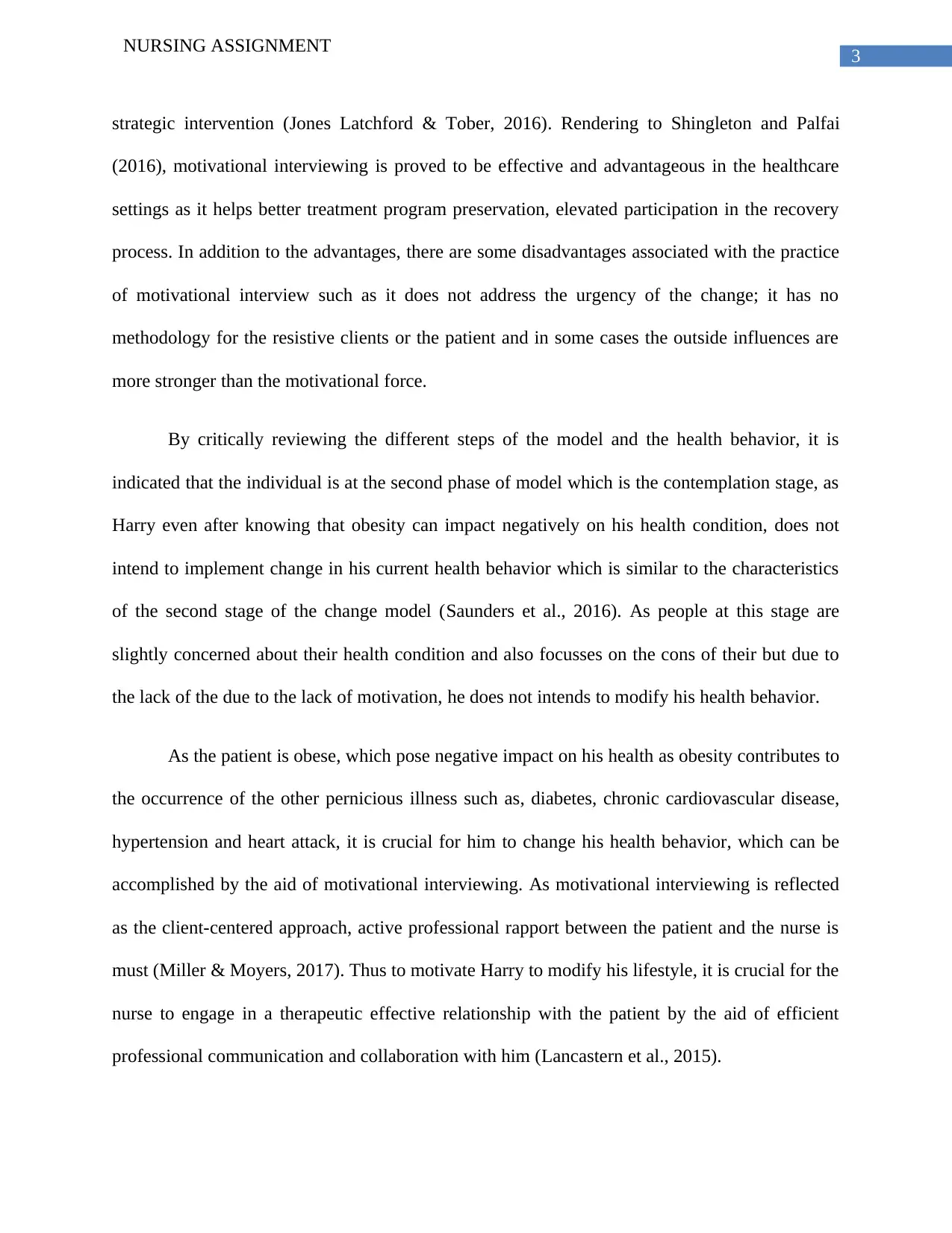
3
NURSING ASSIGNMENT
strategic intervention (Jones Latchford & Tober, 2016). Rendering to Shingleton and Palfai
(2016), motivational interviewing is proved to be effective and advantageous in the healthcare
settings as it helps better treatment program preservation, elevated participation in the recovery
process. In addition to the advantages, there are some disadvantages associated with the practice
of motivational interview such as it does not address the urgency of the change; it has no
methodology for the resistive clients or the patient and in some cases the outside influences are
more stronger than the motivational force.
By critically reviewing the different steps of the model and the health behavior, it is
indicated that the individual is at the second phase of model which is the contemplation stage, as
Harry even after knowing that obesity can impact negatively on his health condition, does not
intend to implement change in his current health behavior which is similar to the characteristics
of the second stage of the change model (Saunders et al., 2016). As people at this stage are
slightly concerned about their health condition and also focusses on the cons of their but due to
the lack of the due to the lack of motivation, he does not intends to modify his health behavior.
As the patient is obese, which pose negative impact on his health as obesity contributes to
the occurrence of the other pernicious illness such as, diabetes, chronic cardiovascular disease,
hypertension and heart attack, it is crucial for him to change his health behavior, which can be
accomplished by the aid of motivational interviewing. As motivational interviewing is reflected
as the client-centered approach, active professional rapport between the patient and the nurse is
must (Miller & Moyers, 2017). Thus to motivate Harry to modify his lifestyle, it is crucial for the
nurse to engage in a therapeutic effective relationship with the patient by the aid of efficient
professional communication and collaboration with him (Lancastern et al., 2015).
NURSING ASSIGNMENT
strategic intervention (Jones Latchford & Tober, 2016). Rendering to Shingleton and Palfai
(2016), motivational interviewing is proved to be effective and advantageous in the healthcare
settings as it helps better treatment program preservation, elevated participation in the recovery
process. In addition to the advantages, there are some disadvantages associated with the practice
of motivational interview such as it does not address the urgency of the change; it has no
methodology for the resistive clients or the patient and in some cases the outside influences are
more stronger than the motivational force.
By critically reviewing the different steps of the model and the health behavior, it is
indicated that the individual is at the second phase of model which is the contemplation stage, as
Harry even after knowing that obesity can impact negatively on his health condition, does not
intend to implement change in his current health behavior which is similar to the characteristics
of the second stage of the change model (Saunders et al., 2016). As people at this stage are
slightly concerned about their health condition and also focusses on the cons of their but due to
the lack of the due to the lack of motivation, he does not intends to modify his health behavior.
As the patient is obese, which pose negative impact on his health as obesity contributes to
the occurrence of the other pernicious illness such as, diabetes, chronic cardiovascular disease,
hypertension and heart attack, it is crucial for him to change his health behavior, which can be
accomplished by the aid of motivational interviewing. As motivational interviewing is reflected
as the client-centered approach, active professional rapport between the patient and the nurse is
must (Miller & Moyers, 2017). Thus to motivate Harry to modify his lifestyle, it is crucial for the
nurse to engage in a therapeutic effective relationship with the patient by the aid of efficient
professional communication and collaboration with him (Lancastern et al., 2015).
Paraphrase This Document
Need a fresh take? Get an instant paraphrase of this document with our AI Paraphraser
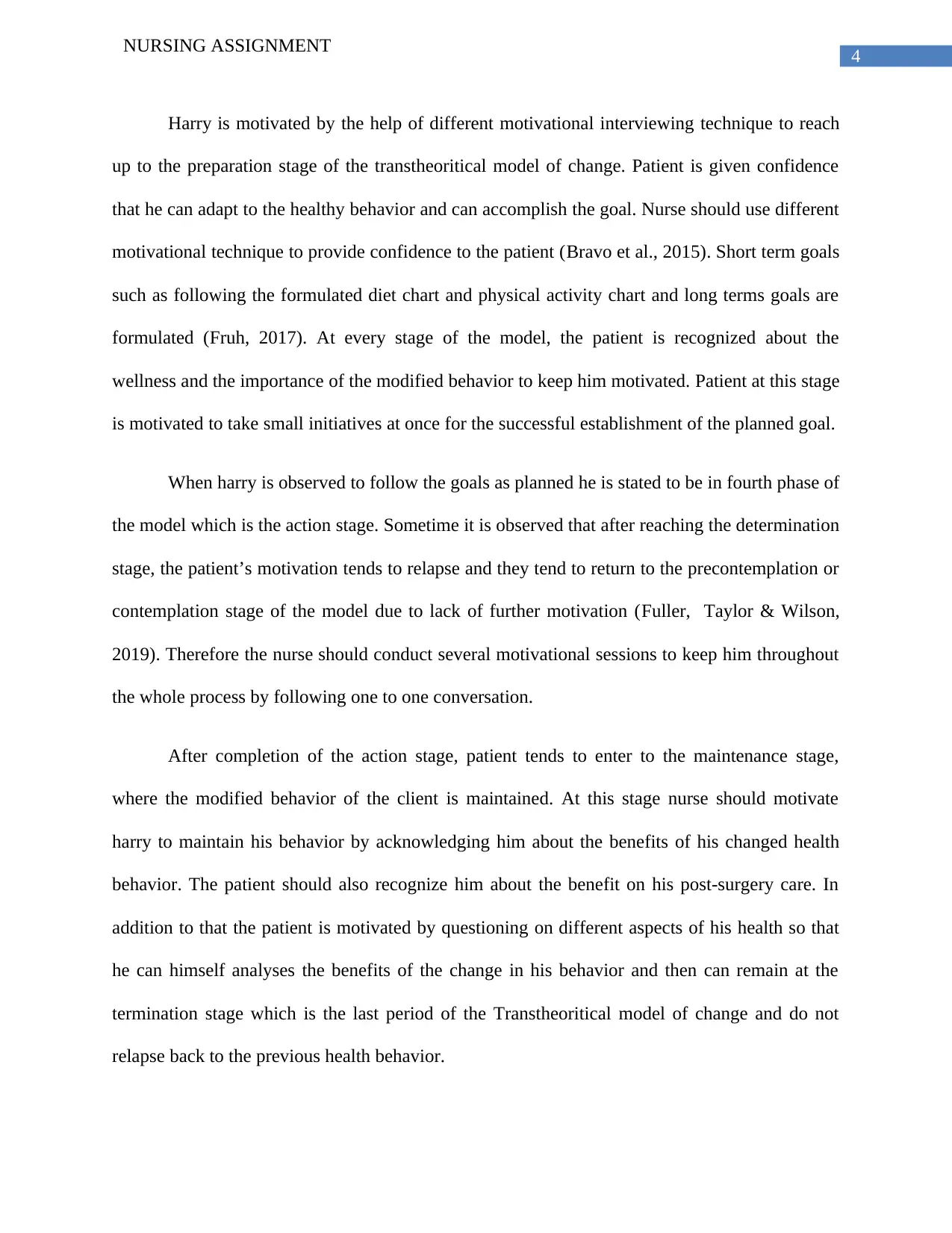
4
NURSING ASSIGNMENT
Harry is motivated by the help of different motivational interviewing technique to reach
up to the preparation stage of the transtheoritical model of change. Patient is given confidence
that he can adapt to the healthy behavior and can accomplish the goal. Nurse should use different
motivational technique to provide confidence to the patient (Bravo et al., 2015). Short term goals
such as following the formulated diet chart and physical activity chart and long terms goals are
formulated (Fruh, 2017). At every stage of the model, the patient is recognized about the
wellness and the importance of the modified behavior to keep him motivated. Patient at this stage
is motivated to take small initiatives at once for the successful establishment of the planned goal.
When harry is observed to follow the goals as planned he is stated to be in fourth phase of
the model which is the action stage. Sometime it is observed that after reaching the determination
stage, the patient’s motivation tends to relapse and they tend to return to the precontemplation or
contemplation stage of the model due to lack of further motivation (Fuller, Taylor & Wilson,
2019). Therefore the nurse should conduct several motivational sessions to keep him throughout
the whole process by following one to one conversation.
After completion of the action stage, patient tends to enter to the maintenance stage,
where the modified behavior of the client is maintained. At this stage nurse should motivate
harry to maintain his behavior by acknowledging him about the benefits of his changed health
behavior. The patient should also recognize him about the benefit on his post-surgery care. In
addition to that the patient is motivated by questioning on different aspects of his health so that
he can himself analyses the benefits of the change in his behavior and then can remain at the
termination stage which is the last period of the Transtheoritical model of change and do not
relapse back to the previous health behavior.
NURSING ASSIGNMENT
Harry is motivated by the help of different motivational interviewing technique to reach
up to the preparation stage of the transtheoritical model of change. Patient is given confidence
that he can adapt to the healthy behavior and can accomplish the goal. Nurse should use different
motivational technique to provide confidence to the patient (Bravo et al., 2015). Short term goals
such as following the formulated diet chart and physical activity chart and long terms goals are
formulated (Fruh, 2017). At every stage of the model, the patient is recognized about the
wellness and the importance of the modified behavior to keep him motivated. Patient at this stage
is motivated to take small initiatives at once for the successful establishment of the planned goal.
When harry is observed to follow the goals as planned he is stated to be in fourth phase of
the model which is the action stage. Sometime it is observed that after reaching the determination
stage, the patient’s motivation tends to relapse and they tend to return to the precontemplation or
contemplation stage of the model due to lack of further motivation (Fuller, Taylor & Wilson,
2019). Therefore the nurse should conduct several motivational sessions to keep him throughout
the whole process by following one to one conversation.
After completion of the action stage, patient tends to enter to the maintenance stage,
where the modified behavior of the client is maintained. At this stage nurse should motivate
harry to maintain his behavior by acknowledging him about the benefits of his changed health
behavior. The patient should also recognize him about the benefit on his post-surgery care. In
addition to that the patient is motivated by questioning on different aspects of his health so that
he can himself analyses the benefits of the change in his behavior and then can remain at the
termination stage which is the last period of the Transtheoritical model of change and do not
relapse back to the previous health behavior.
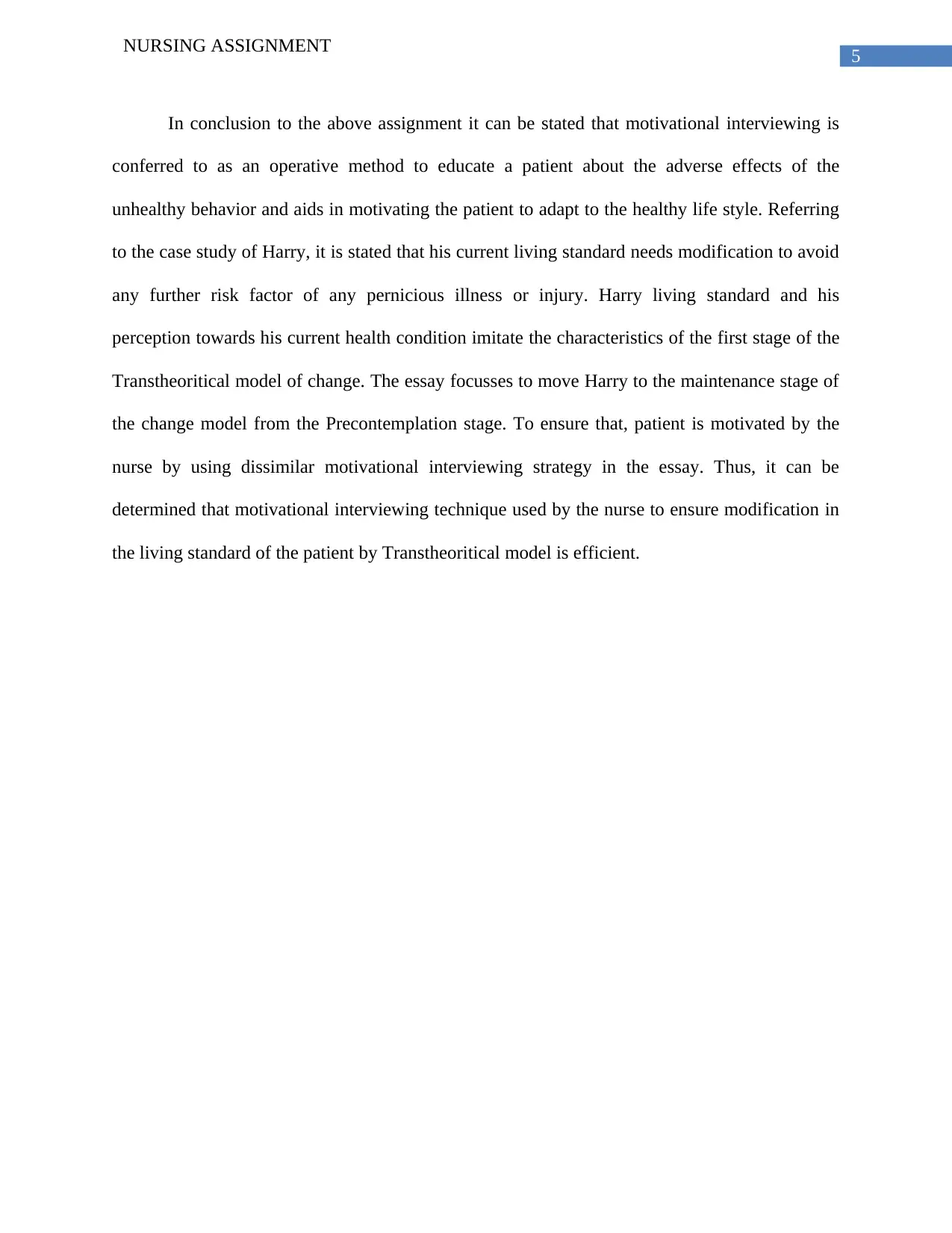
5
NURSING ASSIGNMENT
In conclusion to the above assignment it can be stated that motivational interviewing is
conferred to as an operative method to educate a patient about the adverse effects of the
unhealthy behavior and aids in motivating the patient to adapt to the healthy life style. Referring
to the case study of Harry, it is stated that his current living standard needs modification to avoid
any further risk factor of any pernicious illness or injury. Harry living standard and his
perception towards his current health condition imitate the characteristics of the first stage of the
Transtheoritical model of change. The essay focusses to move Harry to the maintenance stage of
the change model from the Precontemplation stage. To ensure that, patient is motivated by the
nurse by using dissimilar motivational interviewing strategy in the essay. Thus, it can be
determined that motivational interviewing technique used by the nurse to ensure modification in
the living standard of the patient by Transtheoritical model is efficient.
NURSING ASSIGNMENT
In conclusion to the above assignment it can be stated that motivational interviewing is
conferred to as an operative method to educate a patient about the adverse effects of the
unhealthy behavior and aids in motivating the patient to adapt to the healthy life style. Referring
to the case study of Harry, it is stated that his current living standard needs modification to avoid
any further risk factor of any pernicious illness or injury. Harry living standard and his
perception towards his current health condition imitate the characteristics of the first stage of the
Transtheoritical model of change. The essay focusses to move Harry to the maintenance stage of
the change model from the Precontemplation stage. To ensure that, patient is motivated by the
nurse by using dissimilar motivational interviewing strategy in the essay. Thus, it can be
determined that motivational interviewing technique used by the nurse to ensure modification in
the living standard of the patient by Transtheoritical model is efficient.
⊘ This is a preview!⊘
Do you want full access?
Subscribe today to unlock all pages.

Trusted by 1+ million students worldwide
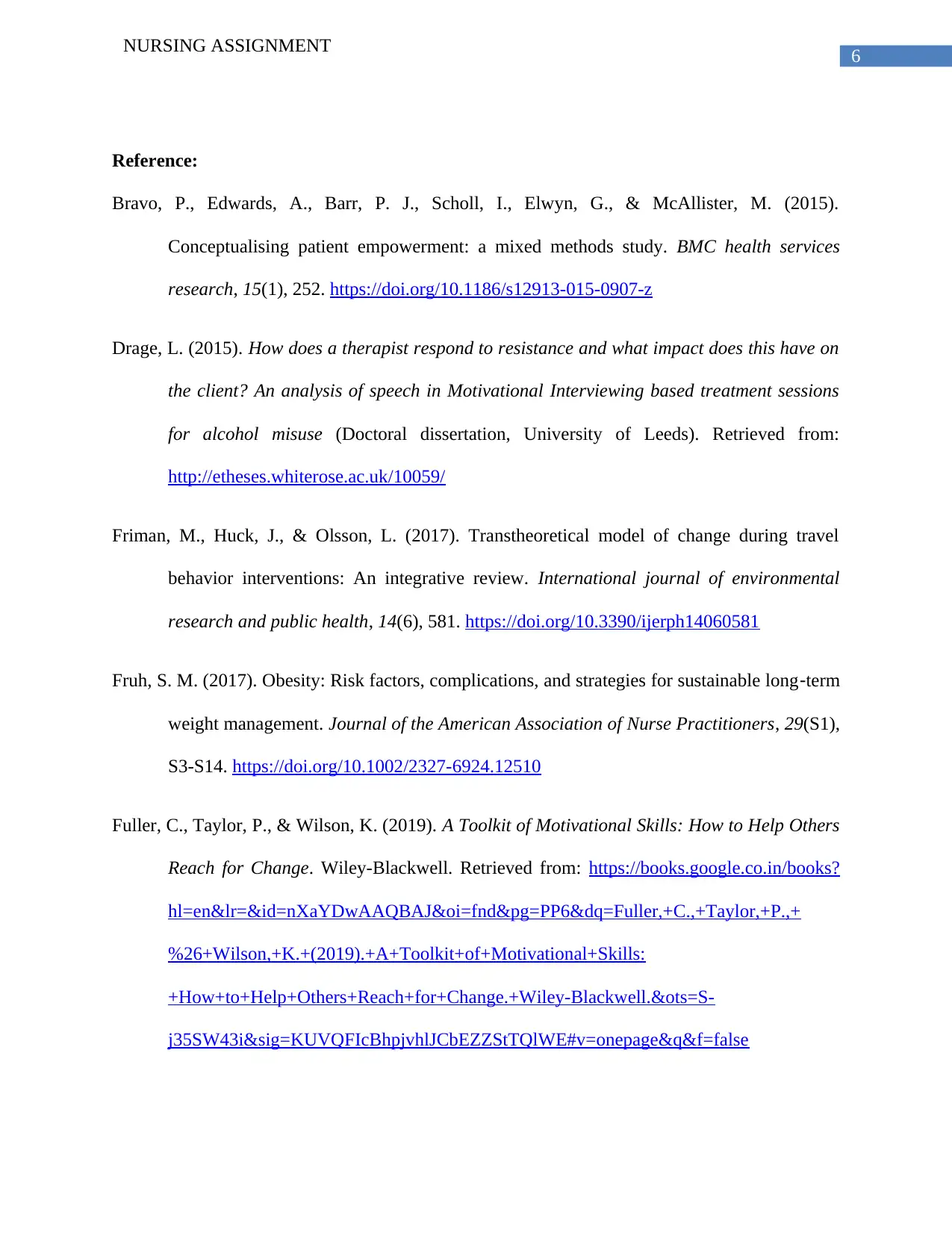
6
NURSING ASSIGNMENT
Reference:
Bravo, P., Edwards, A., Barr, P. J., Scholl, I., Elwyn, G., & McAllister, M. (2015).
Conceptualising patient empowerment: a mixed methods study. BMC health services
research, 15(1), 252. https://doi.org/10.1186/s12913-015-0907-z
Drage, L. (2015). How does a therapist respond to resistance and what impact does this have on
the client? An analysis of speech in Motivational Interviewing based treatment sessions
for alcohol misuse (Doctoral dissertation, University of Leeds). Retrieved from:
http://etheses.whiterose.ac.uk/10059/
Friman, M., Huck, J., & Olsson, L. (2017). Transtheoretical model of change during travel
behavior interventions: An integrative review. International journal of environmental
research and public health, 14(6), 581. https://doi.org/10.3390/ijerph14060581
Fruh, S. M. (2017). Obesity: Risk factors, complications, and strategies for sustainable long‐term
weight management. Journal of the American Association of Nurse Practitioners, 29(S1),
S3-S14. https://doi.org/10.1002/2327-6924.12510
Fuller, C., Taylor, P., & Wilson, K. (2019). A Toolkit of Motivational Skills: How to Help Others
Reach for Change. Wiley-Blackwell. Retrieved from: https://books.google.co.in/books?
hl=en&lr=&id=nXaYDwAAQBAJ&oi=fnd&pg=PP6&dq=Fuller,+C.,+Taylor,+P.,+
%26+Wilson,+K.+(2019).+A+Toolkit+of+Motivational+Skills:
+How+to+Help+Others+Reach+for+Change.+Wiley-Blackwell.&ots=S-
j35SW43i&sig=KUVQFIcBhpjvhlJCbEZZStTQlWE#v=onepage&q&f=false
NURSING ASSIGNMENT
Reference:
Bravo, P., Edwards, A., Barr, P. J., Scholl, I., Elwyn, G., & McAllister, M. (2015).
Conceptualising patient empowerment: a mixed methods study. BMC health services
research, 15(1), 252. https://doi.org/10.1186/s12913-015-0907-z
Drage, L. (2015). How does a therapist respond to resistance and what impact does this have on
the client? An analysis of speech in Motivational Interviewing based treatment sessions
for alcohol misuse (Doctoral dissertation, University of Leeds). Retrieved from:
http://etheses.whiterose.ac.uk/10059/
Friman, M., Huck, J., & Olsson, L. (2017). Transtheoretical model of change during travel
behavior interventions: An integrative review. International journal of environmental
research and public health, 14(6), 581. https://doi.org/10.3390/ijerph14060581
Fruh, S. M. (2017). Obesity: Risk factors, complications, and strategies for sustainable long‐term
weight management. Journal of the American Association of Nurse Practitioners, 29(S1),
S3-S14. https://doi.org/10.1002/2327-6924.12510
Fuller, C., Taylor, P., & Wilson, K. (2019). A Toolkit of Motivational Skills: How to Help Others
Reach for Change. Wiley-Blackwell. Retrieved from: https://books.google.co.in/books?
hl=en&lr=&id=nXaYDwAAQBAJ&oi=fnd&pg=PP6&dq=Fuller,+C.,+Taylor,+P.,+
%26+Wilson,+K.+(2019).+A+Toolkit+of+Motivational+Skills:
+How+to+Help+Others+Reach+for+Change.+Wiley-Blackwell.&ots=S-
j35SW43i&sig=KUVQFIcBhpjvhlJCbEZZStTQlWE#v=onepage&q&f=false
Paraphrase This Document
Need a fresh take? Get an instant paraphrase of this document with our AI Paraphraser
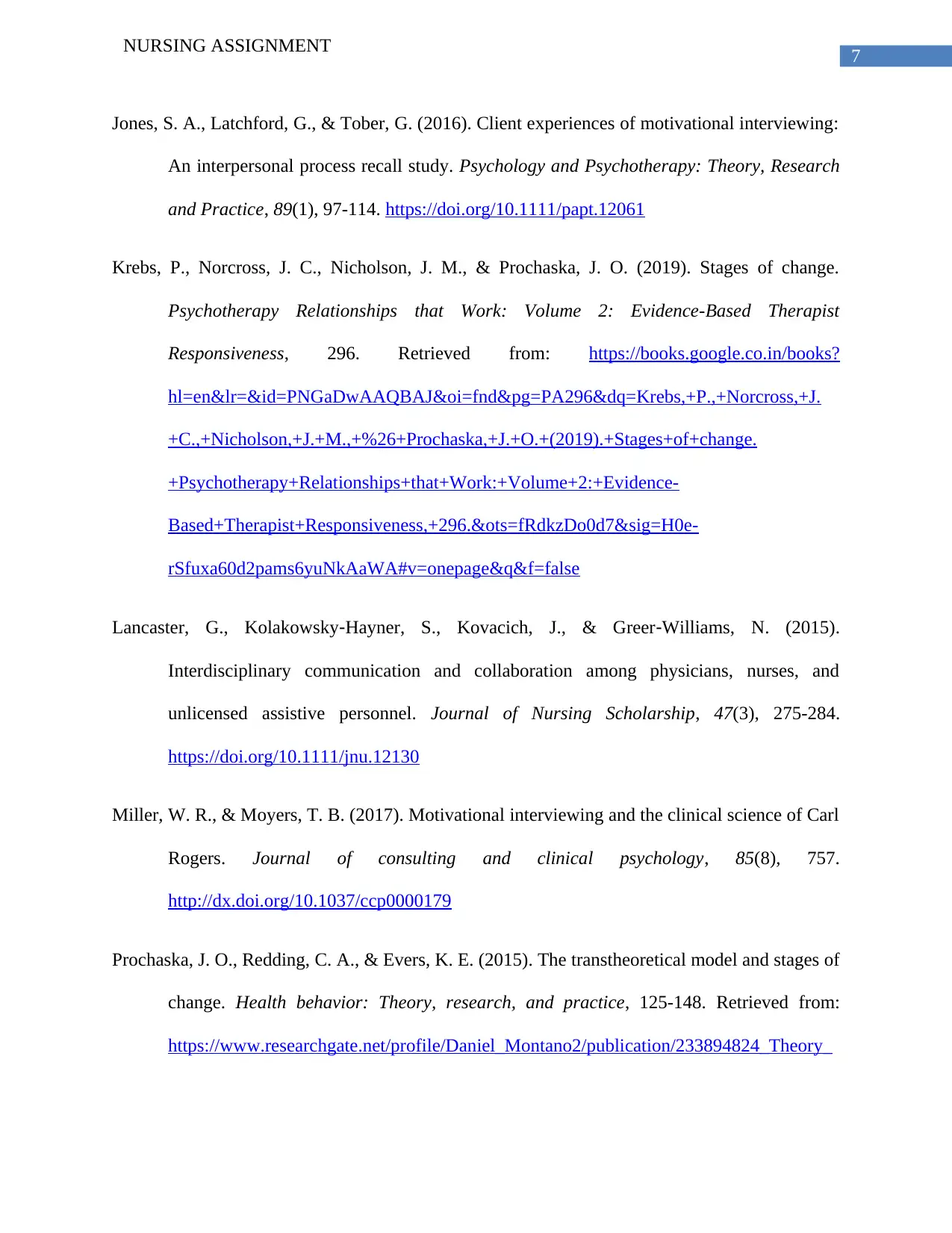
7
NURSING ASSIGNMENT
Jones, S. A., Latchford, G., & Tober, G. (2016). Client experiences of motivational interviewing:
An interpersonal process recall study. Psychology and Psychotherapy: Theory, Research
and Practice, 89(1), 97-114. https://doi.org/10.1111/papt.12061
Krebs, P., Norcross, J. C., Nicholson, J. M., & Prochaska, J. O. (2019). Stages of change.
Psychotherapy Relationships that Work: Volume 2: Evidence-Based Therapist
Responsiveness, 296. Retrieved from: https://books.google.co.in/books?
hl=en&lr=&id=PNGaDwAAQBAJ&oi=fnd&pg=PA296&dq=Krebs,+P.,+Norcross,+J.
+C.,+Nicholson,+J.+M.,+%26+Prochaska,+J.+O.+(2019).+Stages+of+change.
+Psychotherapy+Relationships+that+Work:+Volume+2:+Evidence-
Based+Therapist+Responsiveness,+296.&ots=fRdkzDo0d7&sig=H0e-
rSfuxa60d2pams6yuNkAaWA#v=onepage&q&f=false
Lancaster, G., Kolakowsky‐Hayner, S., Kovacich, J., & Greer‐Williams, N. (2015).
Interdisciplinary communication and collaboration among physicians, nurses, and
unlicensed assistive personnel. Journal of Nursing Scholarship, 47(3), 275-284.
https://doi.org/10.1111/jnu.12130
Miller, W. R., & Moyers, T. B. (2017). Motivational interviewing and the clinical science of Carl
Rogers. Journal of consulting and clinical psychology, 85(8), 757.
http://dx.doi.org/10.1037/ccp0000179
Prochaska, J. O., Redding, C. A., & Evers, K. E. (2015). The transtheoretical model and stages of
change. Health behavior: Theory, research, and practice, 125-148. Retrieved from:
https://www.researchgate.net/profile/Daniel_Montano2/publication/233894824_Theory_
NURSING ASSIGNMENT
Jones, S. A., Latchford, G., & Tober, G. (2016). Client experiences of motivational interviewing:
An interpersonal process recall study. Psychology and Psychotherapy: Theory, Research
and Practice, 89(1), 97-114. https://doi.org/10.1111/papt.12061
Krebs, P., Norcross, J. C., Nicholson, J. M., & Prochaska, J. O. (2019). Stages of change.
Psychotherapy Relationships that Work: Volume 2: Evidence-Based Therapist
Responsiveness, 296. Retrieved from: https://books.google.co.in/books?
hl=en&lr=&id=PNGaDwAAQBAJ&oi=fnd&pg=PA296&dq=Krebs,+P.,+Norcross,+J.
+C.,+Nicholson,+J.+M.,+%26+Prochaska,+J.+O.+(2019).+Stages+of+change.
+Psychotherapy+Relationships+that+Work:+Volume+2:+Evidence-
Based+Therapist+Responsiveness,+296.&ots=fRdkzDo0d7&sig=H0e-
rSfuxa60d2pams6yuNkAaWA#v=onepage&q&f=false
Lancaster, G., Kolakowsky‐Hayner, S., Kovacich, J., & Greer‐Williams, N. (2015).
Interdisciplinary communication and collaboration among physicians, nurses, and
unlicensed assistive personnel. Journal of Nursing Scholarship, 47(3), 275-284.
https://doi.org/10.1111/jnu.12130
Miller, W. R., & Moyers, T. B. (2017). Motivational interviewing and the clinical science of Carl
Rogers. Journal of consulting and clinical psychology, 85(8), 757.
http://dx.doi.org/10.1037/ccp0000179
Prochaska, J. O., Redding, C. A., & Evers, K. E. (2015). The transtheoretical model and stages of
change. Health behavior: Theory, research, and practice, 125-148. Retrieved from:
https://www.researchgate.net/profile/Daniel_Montano2/publication/233894824_Theory_
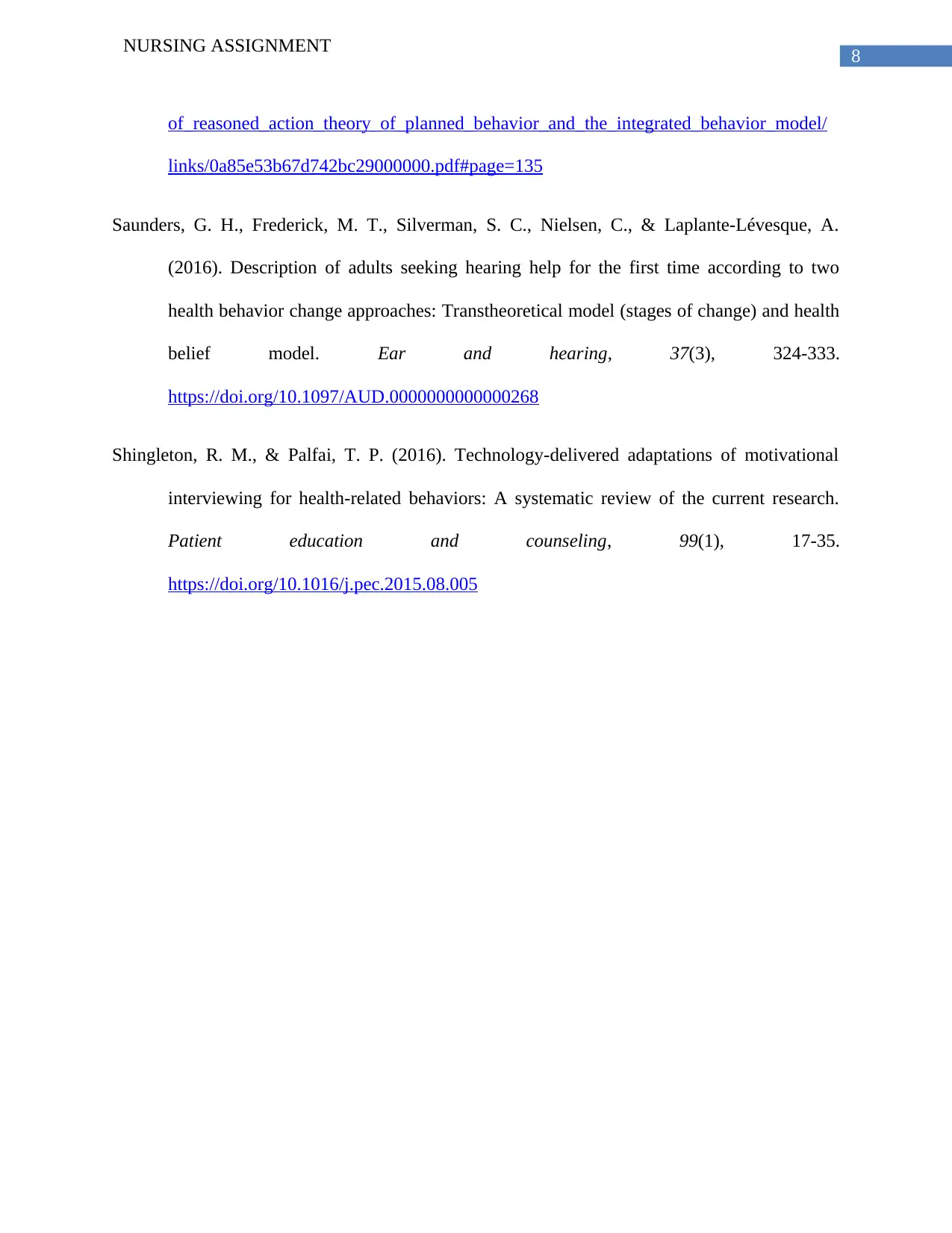
8
NURSING ASSIGNMENT
of_reasoned_action_theory_of_planned_behavior_and_the_integrated_behavior_model/
links/0a85e53b67d742bc29000000.pdf#page=135
Saunders, G. H., Frederick, M. T., Silverman, S. C., Nielsen, C., & Laplante-Lévesque, A.
(2016). Description of adults seeking hearing help for the first time according to two
health behavior change approaches: Transtheoretical model (stages of change) and health
belief model. Ear and hearing, 37(3), 324-333.
https://doi.org/10.1097/AUD.0000000000000268
Shingleton, R. M., & Palfai, T. P. (2016). Technology-delivered adaptations of motivational
interviewing for health-related behaviors: A systematic review of the current research.
Patient education and counseling, 99(1), 17-35.
https://doi.org/10.1016/j.pec.2015.08.005
NURSING ASSIGNMENT
of_reasoned_action_theory_of_planned_behavior_and_the_integrated_behavior_model/
links/0a85e53b67d742bc29000000.pdf#page=135
Saunders, G. H., Frederick, M. T., Silverman, S. C., Nielsen, C., & Laplante-Lévesque, A.
(2016). Description of adults seeking hearing help for the first time according to two
health behavior change approaches: Transtheoretical model (stages of change) and health
belief model. Ear and hearing, 37(3), 324-333.
https://doi.org/10.1097/AUD.0000000000000268
Shingleton, R. M., & Palfai, T. P. (2016). Technology-delivered adaptations of motivational
interviewing for health-related behaviors: A systematic review of the current research.
Patient education and counseling, 99(1), 17-35.
https://doi.org/10.1016/j.pec.2015.08.005
⊘ This is a preview!⊘
Do you want full access?
Subscribe today to unlock all pages.

Trusted by 1+ million students worldwide
1 out of 9
Related Documents
Your All-in-One AI-Powered Toolkit for Academic Success.
+13062052269
info@desklib.com
Available 24*7 on WhatsApp / Email
![[object Object]](/_next/static/media/star-bottom.7253800d.svg)
Unlock your academic potential
Copyright © 2020–2026 A2Z Services. All Rights Reserved. Developed and managed by ZUCOL.





